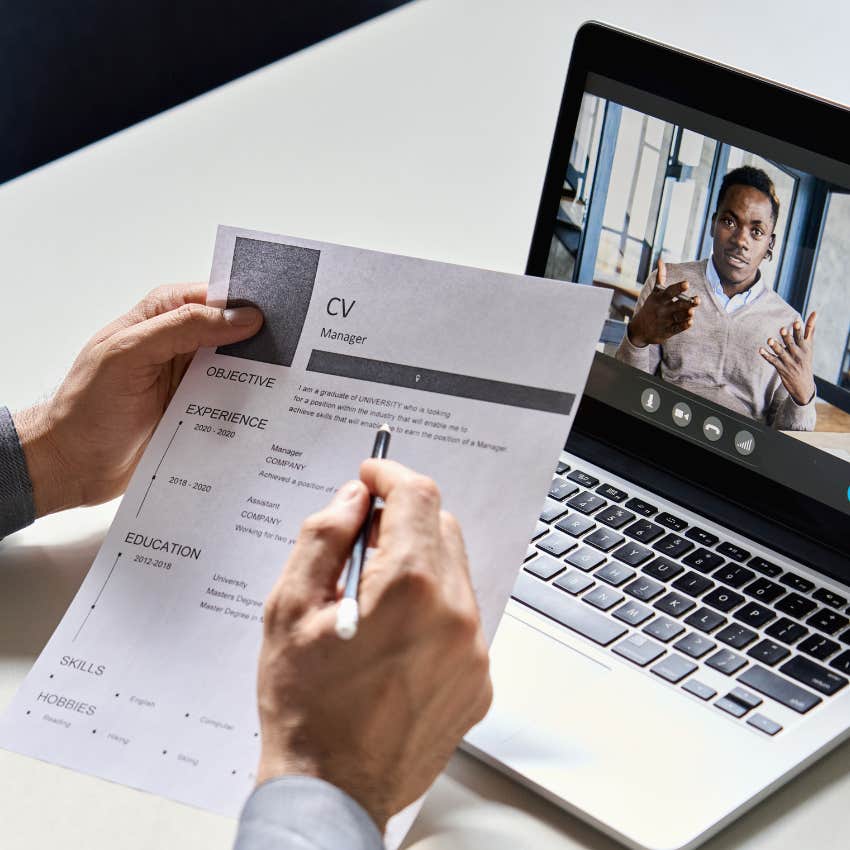Worker Stunned After HR Reps Demand He Do A Video Job Interview Instead Of Over The Phone — 'It's An Invasion Of Privacy'
He claimed that a video job interview should never be required of job candidates.
 fizkes / Shutterstock
fizkes / Shutterstock An employee admitted that he was taken aback after being reprimanded for not participating in a video job interview, instead choosing to call in.
Posting to the subreddit r/antiwork, he questioned if it was normal for job candidates and employees to refuse to show up on camera, claiming that it was a direct violation of privacy.
He was shocked after HR demanded he do a video job interview instead of over the phone.
In his Reddit post, he explained that he'd just finished up a job interview over the phone, but during the entire conversation, they kept asking him if he'd be comfortable turning on his camera so they could see his face. He claimed the HR reps at the job he was interviewing for were quite upset that he hadn't joined them virtually, and he was asked multiple times during the interview to change his mind.
He tried to argue that his video was unavailable because he'd called into the interview, a choice that was given to him. However, his refusal only prompted the HR reps to question if he could try and go somewhere with better service, use someone else's device, or download the platform and use the video option there.
 Photo: instaphotos / Canva Pro
Photo: instaphotos / Canva Pro
"I was firm about doing the interview as is I’m sure I didn’t get this job but it was so bizarre to me. This lady asked me a thousand different ways to get the video going. I simply explained I don’t have good service and that I wasn’t on Wi-Fi so I am just using my phone."
He pointed out that it shouldn't have mattered at all and complained that this was the reason so many HR reps refused to hire candidates and instead chose to waste their time during the interview process.
He argued that his resume should've spoken for him and his ability within the company, but it seemingly all boiled down to his refusal to show his face at all.
"Don’t ever do video interviews in your house. It’s an invasion of privacy. If you’re at work don’t bother doing a video interview when you have the option to call into the virtual space. HR people don’t do your career work, their opinions don’t matter," he advised.
On one hand, this employee was given the option of either virtually attending the meeting, or calling in over the phone. If the choice was meant to be one over the other, then it shouldn't have been given in the first place.
An employee shouldn't be forced to appear on camera, and a company should expect that some candidates may be uncomfortable with sharing a glimpse of their personal space with strangers or worry about their privacy being breached if something important can be seen in the background.
However, there are benefits to appearing for a job interview with the video function.
In the comments section, a hiring manager explained that he conducts all of his interviews through video calls, like Zoom. And it's for a myriad of specific reasons.
"We do this to assess if the candidate has a professional or blurred background [and] can successfully navigate basic tech," they wrote. "Some interviews utilize screen share or link sharing, we want to assess face-to-face communication as the candidate will communicate with co-workers or clients over Zoom and see if they conduct themselves professionally over video."
If you're applying for a remote job, there is a high probability that video conference calls will take place, and you will most likely have to turn your camera on to speak with other work colleagues in these meetings. On top of that, having stable internet at least most of the time is also important for any remote role.
Most job seekers prefer to do in-person interviews.
According to a poll from the American Staffing Association, most job candidates said they preferred in-person interviews, but many respondents hadn't tried a video interview before the mass shift to remote work during the pandemic.
The survey conducted among 2,019 U.S. adults found that 70% prefer in-person job interviews, compared with 17% who favor video calls and 9% who prefer telephone calls. Most of the typical drawbacks that stem from video interviews include possible technical issues, difficulty building connections, and those types of interviews not being taken as seriously as in-person ones.
 Photo: kate_sept2004 / Canva Pro
Photo: kate_sept2004 / Canva Pro
"Candidates are evaluating the company as much as the company is evaluating them. If the role is fully remote, being in person to interview may not matter as much, but if the role requires going into the office, then spending time in the space, interacting with colleagues, and getting a sense of the in-person energy is what candidates want to feel before fully committing," Alan Henshaw, a former recruiter, told the Society for Human Resource Management.
In the end, flexibility in the interview process is key, no matter what. Employers should be able to understand and respect candidates' concerns about privacy during job interviews, just as job candidates should realize that sometimes appearing on camera for work is non-negotiable, but can be done safely and without protocols in place.
There are features on Zoom that can help blur a background, and if you don't feel comfortable having a video interview done in your home, you can go to another location, like a library, where stable internet is available.
Nia Tipton is a Chicago-based entertainment, news, and lifestyle writer whose work delves into modern-day issues and experiences.
